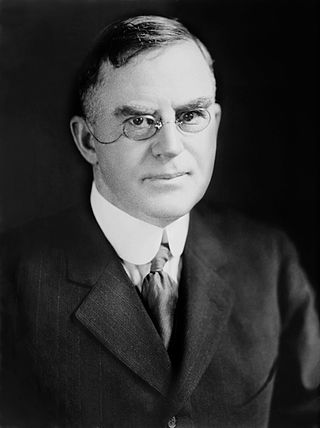
Henry Cantwell Wallace was an American farmer, journalist, and political activist who served as the secretary of agriculture from 1921 to 1924 under Republican presidents Warren G. Harding and Calvin Coolidge. He was the father of Henry A. Wallace, who would follow in his father's footsteps as secretary of agriculture and later became vice president under President Franklin D. Roosevelt. He was an editor of Wallaces' Farmer from 1916 to 1921.

Lorenzo Sawyer was an American lawyer and judge who was appointed to the Supreme Court of California in 1860 and served as the ninth Chief Justice of California from 1868 to 1870. He served as a United States circuit judge of the United States Circuit Courts for the Ninth Circuit and of the United States Court of Appeals for the Ninth Circuit. He is best known for handing down the verdict in the case of Woodruff v. North Bloomfield Gravel Mining Company; his verdict is frequently referred to as the "Sawyer Decision."
Farm Progress is the publisher of 22 farming and ranching magazines. The company's oldest publication began in 1819. Farm Progress Companies is owned by Informa.
The Pantagraph is a daily newspaper that serves Bloomington–Normal, Illinois, along with 60 communities and eight counties in the Central Illinois area. Its headquarters are in Bloomington and it is owned by Lee Enterprises. The name is derived from the Greek words "panta" and "grapho," which has a combined meaning of "write all things."
Chronicling America is an open access, open source newspaper database and companion website. It is produced by the United States National Digital Newspaper Program (NDNP), a partnership between the Library of Congress and the National Endowment for the Humanities. The NDNP was founded in 2005. The Chronicling America website was publicly launched in March 2007. It is hosted by the Library of Congress. Much of the content hosted on Chronicling America is in the public domain.
Michael Schuck Bebb was an American systematic botanist in the 19th century with a reputation as the leading salicologist in both America and Europe. His extensive work on the genus Salix led to several plants being named in his honour.
The Illinois Newspaper Project (INP) began as part of the United States Newspaper Program (USNP), a cooperative effort between the states and the federal government designed to catalog and preserve on microfilm the nation's historic newspaper heritage. The USNP was funded by the National Endowment for the Humanities (NEH) and administered by the Library of Congress, who are currently funding the National Digital Newspaper Program (NDNP), of which the INP is also a part.

Prairie Farmer is a weekly newspaper which covers agricultural and rural news in the state of Illinois. It was first published in 1841 in Chicago, Illinois by John Stephen Wright and was called The Union Agriculturist and Western Prairie Farmer. Its original masthead proclaimed that it was devoted to "western agriculture, mechanics, and education." Prairie Farmer is owned by Farm Progress, a subsidiary of British publisher Informa.
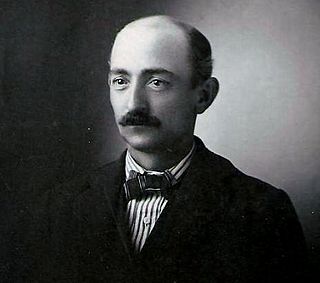
Frederick Hinde Zimmerman was an American banker, farmer, real estate entrepreneur, businessman, and hotel owner. Due to his large land holdings and expertise in farming, Zimmerman became a notable farmer, breeder, and real estate entrepreneur. Zimmerman's farm, originally purchased by his grandfather Thomas S. Hinde from the federal government in 1815, included the Grand Rapids Dam, Hanging Rock, and Buttercrust. His first experience running a business was in 1883 when he ran a grocery store in Fort Smith, Arkansas with his cousin Harry Hinde. Many of his businesses centered on his family farm, but in later years Zimmerman achieved success through his ownership and investment in mines, banks, and real estate. He also owned or invested in the Hanging Rock and Grand Rapids Dam Farm Company, the Grand Rapids Hotel Park Company, and the Wabash Bull-Frog Mines Company.

Jacob Zimmerman was an Illinois state legislator, newspaper editor, and businessman. Zimmerman was a pioneer in the newspaper business in Illinois and Ohio, and a businessman who invested in mining, land, and banks in the Midwest. Zimmerman held a number of elected political offices in Illinois before his death in 1912.
The Anti-Slavery Bugle was an abolitionist newspaper published in Ohio from June 20, 1845, to May 4, 1861. The paper's motto was "No Union with Slaveholders".
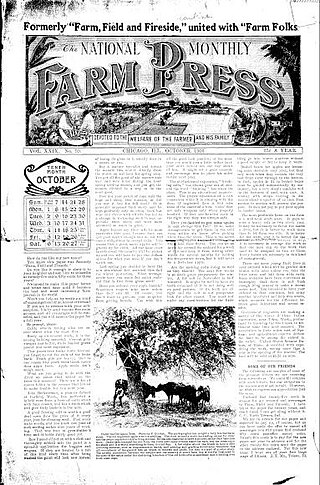
Farm Press was a monthly farming-centered newspaper published out of Chicago, Illinois in the early 20th century. As expressed on the masthead, Farm Press succeeded the newspaper Farm, Field, and Fireside, and was combined with the newspaper Farm Folks. The slogan of the newspaper was "Devoted to the welfare of the farmer and his family."
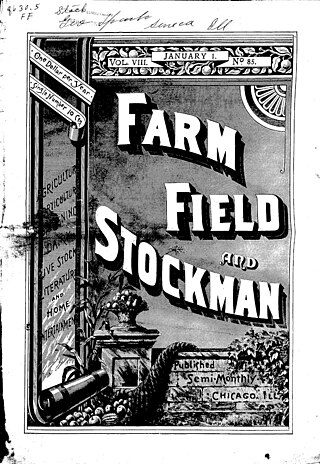
Farm, Field, and Stockman was a weekly American newsletter published in 1884 in the Farm, Field, and Fireside family of farming and home newsletters. Its slogan was: "Agriculture, Gardening, Livestock, and Home Literature." It was merged in 1901 with Chicago, Illinois newspaper Model Farmer and became Farm, Field, Stockman and Model Farmer. After the merger, the newsletter was again combined with Wisconsin Agriculturalist in 1902.

Illinois Farmer was a monthly farming newspaper started in the early 1856 and edited by S. Francis in Springfield, Illinois. and continued to sometime around 1863. It was considered under the "umbrella" of Farm, Field, and Fireside newspapers. Its masthead proclaimed that the newspaper was devoted to the farm, the orchard, and the garden. It was published by Bailhache and Baker. Its editor was M.L. Dunlap
The Day Book was an experimental, advertising-free daily newspaper published in Chicago from 1911 to 1917. It was owned by E. W. Scripps as part of the Scripps-McRae League of Newspapers. Its editor was Negley D. Cochran, previously of The Toledo News-Bee. It was printed in tabloid size to save costs.

The Broad Ax (1895–1931) was a weekly newspaper that began publication on August 31, 1895, originally in Salt Lake City by Julius F. Taylor. After a series of conflicts with the Latter Day Saints, Taylor relocated the newspaper to Chicago in 1899. The Broad Ax has been described as "the most controversial black newspaper in Chicago in the late nineteenth century," in some ways due to its criticism of Booker T. Washington and Tuskegee Institute. The paper covered African American cinema.

The Western Rural and American Stockman (1883-1895) was a semi-weekly newspaper published in Chicago, Illinois. It published articles about agriculture, livestock, and farm life in the United States during the late 19th century. Its editor was Milton George. It was associated with the Farm, Field, and Fireside collective of newspapers.
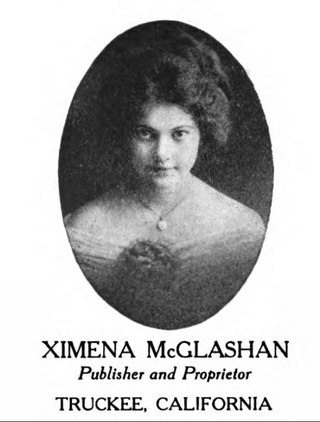
Ximena McGlashan, later Ximena McGlashan Howard, was an American entomologist, and a "butterfly farmer" based in Truckee, California.











